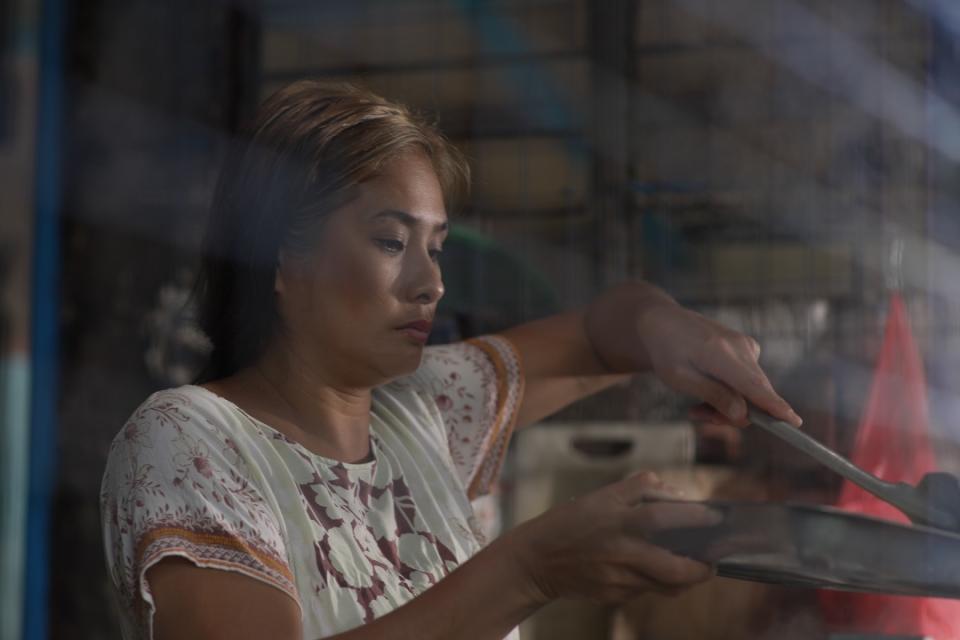“We Have A Complex Relationship With Our Abusers”: Filipino Filmmaker Jun Robles Lana Talks Toronto Title ‘Your Mother’s Son’
- Oops!Something went wrong.Please try again later.
- Oops!Something went wrong.Please try again later.
- Oops!Something went wrong.Please try again later.
- Oops!Something went wrong.Please try again later.

Filipino filmmaker Jun Robles Lana is making his second appearance at Toronto International Film Festival with Your Mother’s Son, which is receiving its world premiere in the Centrepiece section.
Co-scripted by Lana and Elmer Gatchalian, the film tells the story of a hard-working mother and her delinquent son whose relationship is challenged when she invites one of her students to move into their home, so he can escape his violent father. Initially, it seems the son is suffering from a severe case of Oedipus complex, but as the film progresses, a more shocking tale of abuse of power and sexual dynamics begins to unfold.
More from Deadline
Sue Prado (Barber’s Tales) plays the mother, with Kokoy de Santos (Gameboys) playing the son, and Elora Españo and Miggy Jimenez rounding out the cast. Lana, Perci Intalan and Ferdinand Lapuz produced the film through The IdeaFirst Company, Octobertrain Films, Quantum Films and Cineko Productions.
Lana was previously in Toronto in 2012 with Bwakaw, the story of an elderly gay man who takes in a stray dog, which was sold by Fortissimo Films and won several awards on the festival circuit.
A prolific filmmaker, switching between festival films and mainstream titles, Lana also has credits including Barber’s Tales (2013), Die Beautiful (2016), Big Night (2021) and more recently About Us But Not About Us, which won the Critics Pick best film award at last year’s Tallinn Black Nights Film Festival.
He also recently directed comedy thriller Ten Little Mistresses for Amazon Prime Video, which he also produced through The IdeaFirst Company, the production outfit he runs with Intalan.
Deadline: What was the initial inspiration behind Your Mother’s Son?
Jun Robles Lana: We started making the film two years ago at the height of the pandemic, a time when Duterte [Philippines’ former president] was still very much in power, and it was a horrific time for everybody. You’d wake up every day to news of people dying of Covid, but also people being shot in the streets because of Duterte’s drugs war. We were asking ourselves – where is the tipping point? Because it was obvious something’s wrong and yet we’d become complacent.

So I started working on this story, which alludes to what was happening, because I wanted to portray a society that’s immoral – we’re living in a time where what is wrong has been accepted as normal.
I’m also trying to make sense of this really complex relationship we have with our abusers – because in the Philippines we were colonised by Spain for 300 years, we were under American rule for 40 years, Japanese rule for three years, we were under martial law for 21 years during the time of Ferdinand Marcos, and then we had six horrific years of Duterte’s drugs war.
And yet we love our abusers, we put them in positions of power. So basically, I’m just trying to make sense of this really complicated and long, deep history of oppression.
Deadline: The film plays out as an allegory – is that because you’re not able to tackle these issues head on?
Lana: I recently made a film called Big Night that tackled the drugs war although I didn’t mention Duterte directly. I turned that film into a comedy, not just because I wanted a different perspective, but because at the height of the drugs war, it really felt like a circus. Many Filipino films have tackled the drugs war and yet we’ve still become complacent to it – to the extent that it doesn’t even spark conversation. That’s the real tragedy. So I used comedy to lure audiences in, but then make them realise this film is about us and we need to talk about the problem.
Deadline: Were you writing Your Mother’s Son during the pandemic? When did you shoot?
Lana: We were writing for almost a year and filmed in 2021. We were waiting for Sue Prado’s schedule because I don’t think any other actress would be able to do what she does in the movie. She’s one of those very rare, brave actors who’s ready to portray anything and will do anything if the role calls for it.
She also understood one of my struggles while writing is that I didn’t want to demonise women in this film. I didn’t want it to be about gender. So we had a lot of long discussions and a series of workshops with the actors to help everyone understand why the story plays out the way it does. The insights Sue shared with me were really interesting and helped me to revise and polish the script.

Deadline: Was it important to make the main character a mother in the film? Do mothers have a special role in Filipino society?
Lana: Definitely yes, the Philippines is a matriarchal society. We put women on a pedestal, especially our mothers, they’re the decision makers in the family and we also feel safe with them. But here, the role of a mother takes on a lot more nuances – she seems to care for the boys, but can we really trust this character? Again, it’s like the institutions we look up to and expect to protect us, they’re always disappointing us.
Deadline: Many of your films seem to use sex and family relationships to comment on some quite dark social issues. Are you making your films for a local or international audience?
Lana: I’ve been asked many times if I’m willing to explore stories with lighter themes, but I make movies primarily for the Filipino audience, and even if some of my films get into international film festivals, that was never really the point. I wouldn’t say that I make political films, but I make films that reflect the Filipino experience, and it just so happens that we’re still a developing country and these are our concerns right now. I feel as storytellers we have a responsibility to reflect what’s happening to us on the big screen and hopefully start a conversation.
Deadline: How do you finance your films?
Lana: We make mainstream films, like comedies and horrors, that help me fund my more personal projects. Die Beautiful was a crossover – it was made as an arthouse film but became a mainstream hit. I previously worked at [Philippines broadcaster] GMA for 17 years, starting out as writer, then also directing soap operas, which are big in this country. It really helped me understand the pulse of the mass audience – what people want to watch and what they’re willing to pay for.
Deadline: You’re known as an LGBTQ+ filmmaker, but this is not really an LGBTQ+ film, so will it be more difficult to market?
Lana: Yes, most of my stories are for and about my community, and I’m sure some people watching this film will be asking where is the gay character. But there was really no need for a gay character – this is our story, a story every Filipino could relate to, whether gay or straight. This is our collective trauma as a nation. I think my biggest concern right now is how we can release the film in the Philippines with the content that is required, but also graphic, because we have to contend with our censor board.
Deadline: How healthy is the Philippines film industry right now?
Lana: Oh, it’s a struggle right now, especially now we’re getting out of the pandemic. It’s really sad that audiences haven’t returned to the cinemas to watch Filipino movies. We have Hollywood blockbusters making money in our cinemas, but the last local films to make money were shown during Metro Manila Film Festival last December and the festival only has eight slots for Filipino films. I think it’s really time for our government to intervene, to not just entice people back to the cinemas, but also to educate audiences how to appreciate Filipino movies. After all, this is an industry and can boost employment. So we’ve recently had a lot of discussions about what we can do.
Deadline: What are you working on next?
Lana: I’ve just finished a mainstream comedy Becky And Badette, which is a female buddy comedy, starring Pokwang and Eugene Domingo. Then we’re also developing some projects for Netflix and Amazon, both films and series, through our company.
Best of Deadline
2023 Premiere Dates For New & Returning Series On Broadcast, Cable & Streaming
Venice Film Festival 2023 Photos: The Red Carpet Premieres & Closing Ceremony Winners
SAG-AFTRA Interim Agreements: Full List Of Movies And TV Series
Sign up for Deadline's Newsletter. For the latest news, follow us on Facebook, Twitter, and Instagram.

